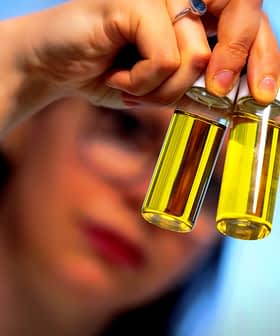 5K reads
5K readsHealth

New research published in the International Journal of Food Microbiology has paved the way for the novel use of olives as a source of probiotics in our diets.
Probiotics are the healthy bacteria necessary for gut health, balancing intestinal flora and stimulating protective functions of the digestive system. They are essential for a healthy gut, particularly when an antibiotic, that strips the digestive system of its natural bacteria, is being used.
Due to their oral administration, probiotics must be able to withstand the harsh physical and chemical environment of the human gastro-intestinal tract, and need to be ingested in large quantities daily to have a beneficial effect. As varying probiotics react differently in the digestive environment, the challenge is not just introducing them to the body, but introducing specific bacteria types that can survive and flourish in the very specific GI conditions.
Although most commonly seen as a functional component of certain yogurts and dairy products, new research carried out at the Consejo Superior de Investigaciones Científicas (CSIC) in Spain, is now suggesting that there it the possibility to use olives and bacteria present in the fermentation process, to introduce these beneficial organisms to our bodies.
Electron microscopy techniques have shown that bacteria and yeast that is responsible for the fermentation of certain Spanish table olives associate with one another to form communities known as a’ biofilm’. Previously, it was thought that these bacteria dispersed in the brine used to preserve the olives during the process, however, the new findings suggest that in fact the biofilm compound forms and stays on the surface of the fruit. The formation of this microscopic layer is thought to be due to the high concentration and availability of sugars, amino acids, vitamins and other nutrients during the process of fermentation, providing the ideal environment for the survival and growth of these bacteria.
An olive of the Gordal variety, for example, may have as many as 100 billion Lactobacilli residing on its surface, which are they ingested when the olive is consumed. The probiotic nature of these bacterial strains is now the subject of investigation by the CSIC, with some bacteria and yeast strains already present in the fermentation exhibiting beneficial effects on gut health. There is also the possibility that different, desirable, healthy bacteria strains may be able to be used in the fermentation process, and thus delivered to the body via olives.
Due to their high fiber and antioxidant levels, if olives could also be used to deliver probiotics to the body, they could be classified as a functional food. There is also the possibility of therapeutic uses, with previous research done on Portuguese table olives indicating that several of the bacteria present during the fermentation process have the ability to inhibit the growth of Helicobacter pylori, a common human pathogen that is resistant to a growing number of antibiotics. This shows a potential for such probiotics to be used as an antibiotic alternative.
The use of olives as a source of probiotics may be preferable for those who are unable to eat dairy due to intolerances or those who require a heart healthy diet.








